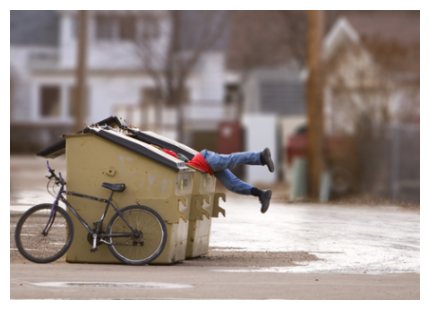 "Bottomists" are Learning to Live "Outside" of Their Money
"Bottomists" are Learning to Live "Outside" of Their Money
"I learned that there are two ways to be rich," said Isaac Huygens, a Seattle lawyer and self-proclaimed "bottomist." "You can either make a lot of money and worry about it until it consumes you like a snake eating an egg, or you can reduce your cost of living so drastically that whether you make money or not, your life is exactly the same."
For bottomists, most of the things you can spend money on in our society only make life more difficult. Bottomists see their thriftiness not as a way to "make ends meet," but as the only logical way to live in a world full of consumer scams and cons.
"There is nothing good to buy," said Huygens. "The internet is free, no ladies are impressed by cars or jewelry anymore, and I would get lonely in a house all to myself."
Resisting the term "miser" or "tightwad," "bottomists" say they gladly spend money when there is something worth purchasing, but that in a society where information is king and where "information wants to be free," they are finding it harder and harder to waste their hard-earned cash.
"I make plenty of money as a lawyer," said Huygens. "But I don't spend any of it. I couch surf and I trade legal advice for organic fruits and vegetables. I keep certified copies of my law degree with me like other people keep business cards."
According to Huygens, most people are driven to acquire wealth because of unfounded fears about what their lives will be like if they are poor.
With the increasing wealth disparity between the super-rich and everyone else in America, "bottomists" say there are only poor people left and so if you want to have friends, you have to "act poor."
"We are all poor now," said Amanda Semple, an MFA student at Washington State University. "Middle class only means that you aren't actually on food stamps."
Like freegans or "crust punks," bottomists seek out the best deals and cheapest goods by using the internet as a way to sort data, though bottomists say they are not motivated by political hatred of the "system."
Bottomist Dr. Anthony Young is a neurosurgeon and member of the Seattle Republican Party. He says he uses the money he saves as a bottomist to run a free clinic in his neighborhood.
"Bottomists reinvest money in their businesses and fund community art projects," said Dr. Young. "We are always on the lookout for new scientific processes that might make the cost of food or technology cheaper."
According to Dr. Young, bottomism is the natural result of a scientifically-driven economy. It is the "good part" of our country's exploitative relationship with the environment and petrochemicals.
"I love corn syrup," said Dr. Young. "You know that movie where the dude eats nothing but McDonald's for a month? I did that for a year once, and I was fine because I only ate there once a day and I had a fresh fruit smoothie for breakfast."

In addition to learning to play the clarinet (which he bought from Craigslist), Dr. Young is bankrolling a giant papier mache aquarium that he hopes to burn at next year's Burning Man festival.
"When you live outside of your money, you see that the low life is actually rather nice," said Dr. Young. "It is quite thrilling and you make closer friends. I hate other doctors."
Posted by miracle on Sat, 30 Oct 2010 03:45:17 -0500 -- permanent link




